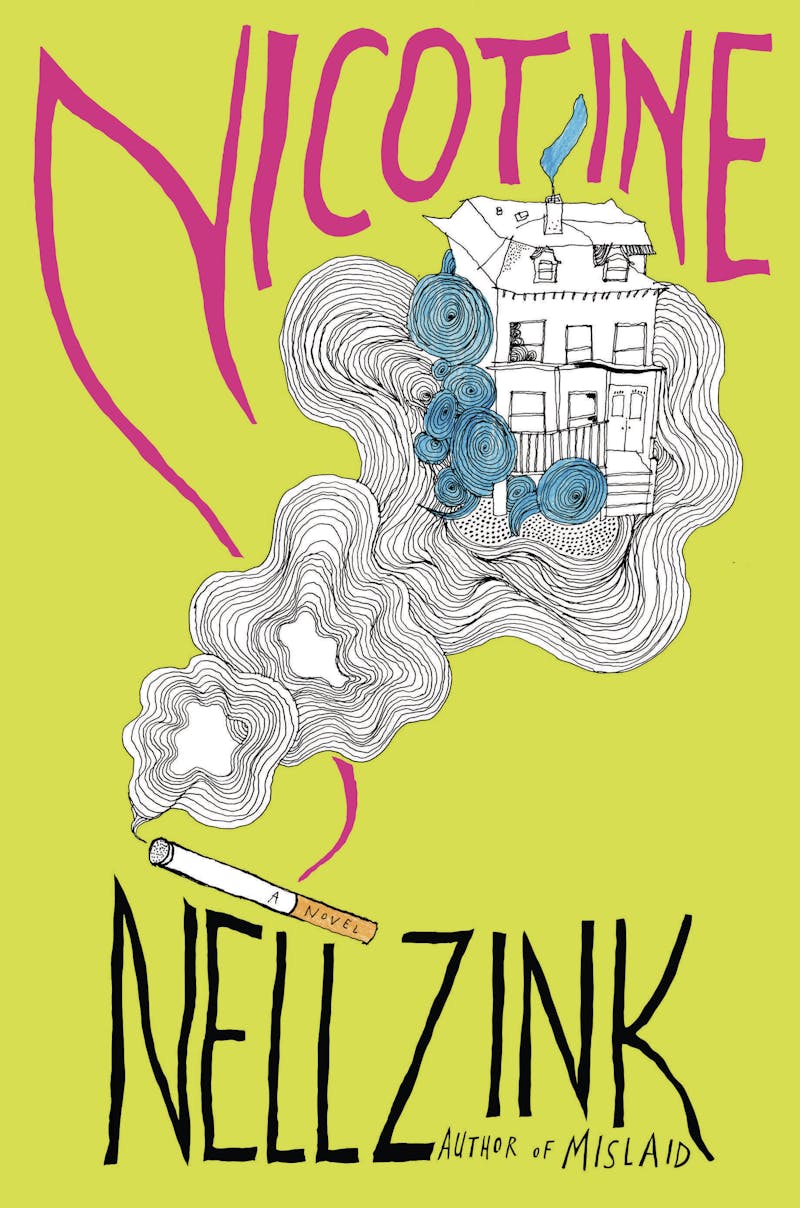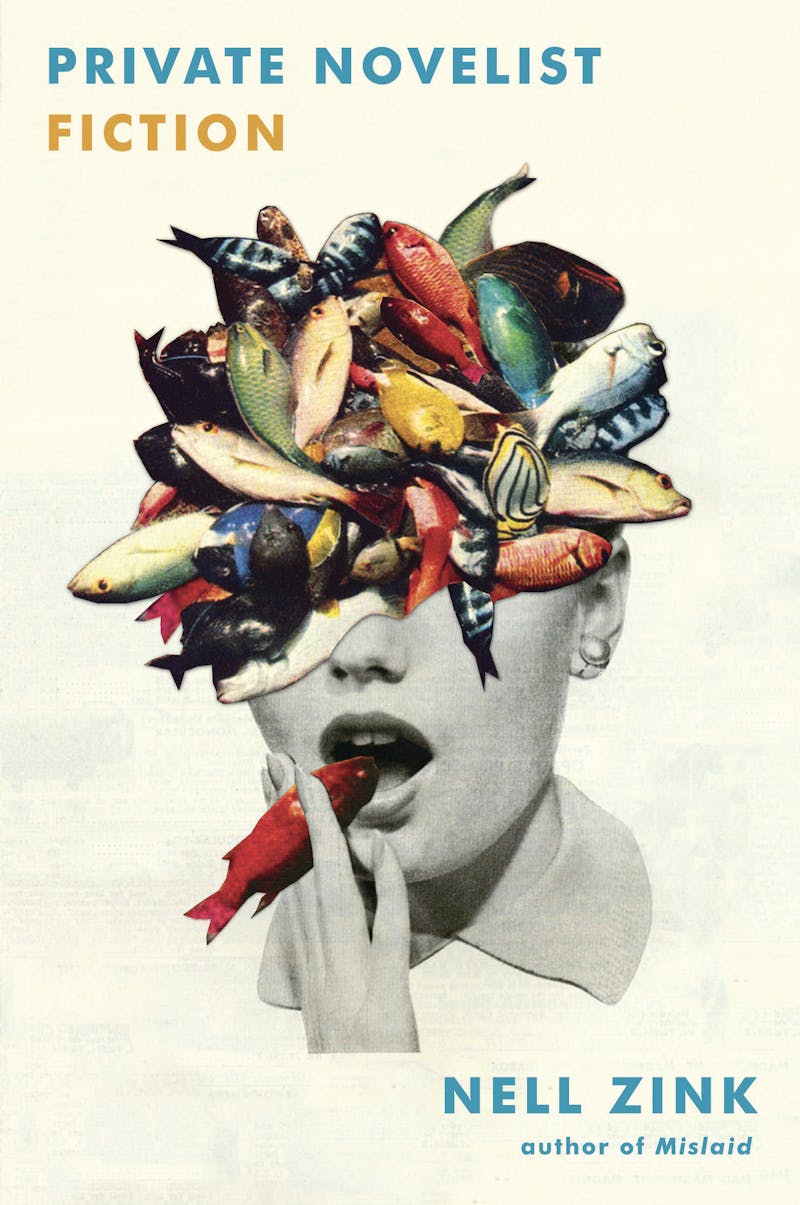
“I felt like the Empress Theodora. Can I get more orifices?” Thus wonders the narrator of The Wallcreeper, Nell Zink’s 2014 debut. “Is that what she meant in the Historia Arcana—not that three isn’t enough, but that the three on offer aren’t enough to sustain a marriage?” This is how all of Zink’s jokes go. She starts off nasty and allusive, confusing you with bits of history you don’t know, then curdles the thought into something between an aphorism and a punchline. Laugh, cry, put the book down—see if she cares.
We haven’t had very long to get to grips with Nell Zink. Born in 1964 in California and raised in rural Virginia (she always includes the “rural” in professional bios), Zink became famous with her acidic debut only two years ago. Magazine profiles invariably emphasize that she’d published practically nothing before striking up an epistolary friendship with the novelist Jonathan Franzen in middle age. After Zink contacted Franzen about endangered birds in 2011, she published two novels in rapid succession. First came The Wallcreeper, then Mislaid in 2015, then a whole slew of reviews explaining Zink’s charming rags-to-riches tale, while praising her freakish novels in vague terms. The Guardian said that Zink “succeeds in putting into words the most inexpressible experiences,” which is not very specific.
This version of Zink’s story is troubling but convenient. It posits Franzen as a heroic excavator of talent, fishing Zink out of obscurity like a bog person out of the peat. At the same time, it doesn’t tell us much about Zink herself or the deeper origins of her books. Reading Franzen doesn’t particularly help us read Zink: Even though some of their concerns are similar—they are both vicious on the subject of middle-class hypocrisy—there are few obvious similarities between Franzen’s universalizing social novels and Zink’s short, frantic fictions. The critics have been a little too ready to hitch a female writer’s star to a completely different male wagon, no doubt because a lot of them are mildly sexist.
On the other hand, the discovered-by-Franzen narrative has at least the virtue of coherence. We use Franzen as a way to understand a career that otherwise makes no sense at all: Zink’s novels, while undeniably excellent, are so strange that it is hard to understand why anybody actually likes them. Zink satirizes average-to-privileged people in the manner of Jane Austen, but her books are too short to run to social commentary. She’s also wildly erudite, but straightforward, even plainspoken, in her vocabulary. American publishing today milks a reliably profitable herd of authors for bland, high-fat novels. Zink’s work is distinctly unpasteurized, and yet—here she is.
Zink’s two new books emphasize her contradictions, and offer some clues to her appeal. Nicotine, a novel, and Private Novelist, which is harder to categorize, represent the two sides of Zink’s bizarro stylistic coin. The first is propulsive and plot-driven, adventurous and populist; the second digressive and experimental, written for a highly educated audience of one. Nicotine is most like Zink’s more traditional second novel, Mislaid, while Private Novelist takes after her difficult debut, The Wallcreeper. In one, she wants us to think with the heart, in the other with the head. Love and care for one another, she seems to say, but know that you do it against the backdrop of decayed and overloaded and nonsensical cultural wreckage, in a world that mostly is meaningless.
Nicotine is the story of a beautiful young woman named Penny, who falls in with an anarchist collective and must reassess her politics and her sense of self simultaneously. Penny watches her father die in the first third of the book. The dead father is named Norm, which is surely symbolic. Penny is the child of Norm and a woman named Amalia, whom Norm rescued as a child from a garbage dump in Cartagena. Norm is a kind of hippie icon who runs a healing center. Before he married this rescued child, Norm had two kids, named Matt and Patrick, with an American woman, who mysteriously disappeared. Matt is now a sociopath who designs innovative garbage trucks for a living, while Patrick lives on a pristine island and rarely appears. Norm finds Amalia besieged by pigs, covered in filth. You could call trash—physical trash, trashy aesthetics, the disposed-of in culture and humanity—a theme of the novel.

After Norm’s horrible death, Penny goes to visit a long-neglected family property and finds it full of attractive and charismatic squatters. The squatters have named the house “Nicotine,” after their cause within the activist community: They are all smokers, which is tough nowadays. (There are other houses within their collective called “Tranquility” and the like.) Penny falls in with its informal tenants, but she does not disclose her claim to the land. Matt and Amalia fight her for rights to the property; they wish to develop it into something profitable. The house becomes a good and complex (if slightly on the nose) symbol of personal and political identity. Of course, it gets destroyed. But can Penny be rebuilt?
Nicotine’s satire of bourgeois morality bites at hypocrisy with Zinkian snappishness, but retains a conventional level of sympathy for its attractive female protagonist when she gets into hot water. Penny goes to a protest in Manhattan, where she’s arrested, and she doesn’t have any Tylenol when she needs it in jail. Later she’s blamed unfairly by other political types for what happened at the protest, but we remember her private pain, and her friend comforts her in the cell. The pretty heroine generally does the right thing. It’s a little bit boring, in that respect.
In its tenderness toward Penny, Nicotine recalls Mislaid. The earlier book pits its characters against a very odd plot about race and mistaken identity, but in the end we simply want to see its central characters, like Peggy, find some peace. After Odyssean trials and tribulations, Peggy looks back on her life and sees “years so weary and routine laden, they seemed like a single year that had repeated itself.” The stakes are fundamentally human. This is Zink at her most heartfelt.
Both Nicotine and Mislaid display Zink’s flair for crafting absorbing narrative out of unpredictable subject matter. Private Novelist, by contrast, consists of two bonkers stories of differing length and quality hammered together into one book for no good reason at all. The first is a novel, titled “Sailing Toward the Sunset by Avner Shats,” and the second is something like a novella, named “European Story for Avner Shats.”

The Avner Shats in both titles is a real person, an Israeli author and poet. The conceit behind the book is that Zink wrote for her friend’s entertainment and edification before she ever wrote for the public at large. Hence the idea that she was a “private novelist,” otherwise a contradiction in terms. The repeated reminders that these works were never really intended for publication excuse their flaws while making them feel uniquely intimate. A writer who meant a story for one person and one alone must surely care for her reader in a way that no commercial novelist can care for her audience. What a privilege, to bask vicariously in that love!
“Sailing Toward the Sunset by Avner Shats” has an excellent premise. Zink sets out to translate Shats’s novel Sailing Toward the Sunset into English, but her Hebrew is not good enough. So, in a series of emails to Shats, written daily, she starts over—each time taking the material in a different, brilliantly misguided direction. The resulting novel is readable, but only just. It includes real-life human beings, like Zink and her ex-husband, Zohar Eitan, but also a silkie (the mythic Scottish seal-woman, usually spelled “selkie”) and a huge, gelatinous submarine. Perhaps most telling is Zink’s announcement of her own literary preferences. She both obsesses over The Pickwick Papers—a picaresque novel like her own—and riffs on her dislike of A.S. Byatt’s best-seller Possession:
As I skimmed it my face was contorted by sneers, and after skipping to the end to make sure the heroine really was the direct descendant of the vigorously adulterous dead poets and heiress to their fortunes, I resolved to write a novel myself. The result now lies before you.
Hubristic statements like this one force us to reckon with the precious, deliberately off-putting quality of Private Novelist. I rather liked Possession, for instance. Sure, it was very romantic about history. Was my liking for that book fake? I hated Zink for calling me a fake, which is what it felt like she was doing. Meanwhile, I hated her version of Sailing Toward the Sunset in places: specifically the places where Zink transcribes her own notes. “Gide’s acte gratuit <=> surrealist activity?” she wonders. “Lukács notes, I think?” Private Novelist is a brain-dislodgingly imaginative book that, nevertheless, seems to conjure our hatred on purpose.
“European Story for Avner Shats” was written over the course of one month in 2005. This time, the high concept is that Zink must write about a cast of characters dreamed up by Shats: X type of artist from Y country does Z thing, and so on. She must also write entirely in “bad English,” so all of her characters are German, Italian, Israeli, Swiss, or people of unidentifiable origin staying at an artists colony. (Actually there is a British character, too, but nobody understands him.) Her characters say things like, “How can you call him a thief and a pornographer? Get out of my room. You are bored, but we are not your interactive television.” The best part of “European Story” is a very rude letter supposedly written by Goethe to Schubert, discovered in a drawer by one of our unfortunate young European thinkers and later thrown in a fire by another.
The themes unifying “Sailing Toward the Sunset by Avner Shats” and “European Story for Avner Shats” are Israeli masculinity, maritime motifs, destruction by fire, and sexy young women whom other characters are not sure whether to trust. This book could have been awful, but arrives squarely at the Günter Grass level by dint of an interlude about a wonderful jewel that arrives in the mail and contains visions of pastoral scenes in each of its many facets. The jewel was sent by a mysterious agency. It contains worlds, and leads Zink to experiences of the sublime. Who sent this jewel and why? The Swedish Academy called Grass’s fiction “frolicsome black fables,” which is a great description of Private Novelist, too.
While Nicotine, like Mislaid, is an individualistic romance, Private Novelist, like its predecessor, The Wallcreeper, is a commentary on history, not on people. The latter two books display such painful awareness of their place in the history of Western culture—specifically European culture—that their frenzied plots serve more to upend the reader’s sense of the way people are than to expand upon it. (The Wallcreeper makes fun of environmentalist men, but through mean one-liners about stereotypes rather than through a sensitive treatment of character.) These books mock, laugh, then look for the next joke. Zink holds fiction at arm’s length—affectionately, but with suspicion.
So, we have two Zinks: one the pleasant author of pleasant and entertaining novels, the other an obstinate obscurantist at war with the idea of fiction. This mixture ends up placing her in the ironically well-worn tradition of classic surreal satirists like Bulgakov, Hesse, Grass—even Kafka.
Zink is an architect. She builds worlds that look a little like ours, but are wrong enough to make one think—really think, not just feel. Kafka wrote in a notebook once that “there is no such thing as observation of the inner world, as there is of the outer world.” We see our bedrooms at a level of detail totally unavailable to us when we try to look at our own souls. Zink constructs her fictional worlds with this in mind. By irritating and confusing her reader, Zink reminds us that the fiction writer cannot know the world inside and out truthfully, cannot trust the world she makes by looking inward.
Together, Nicotine and Private Novelist explain why Zink’s writing works so well. She tells stories with the precision of somebody who actually knows quite a lot about life—which the young and overhyped in fiction writing inevitably lack—then salts them massively with disruptive, surreal interludes and skepticism over her own project. Possession is trash, garbage heaps are trash, notebooks full of crappy notes about Gide are trash—but pointing all that out is necessary to Zink’s project. The fiction market today loves a big book that feels realistic. We laugh, we cry, but we never want to throw the book away. “Unputdownable” is the adjective a book needs in order to sell, and selling is the thing that makes a book pick-up-able by the publishing house.
Instead of grossing you out, Zink’s over-seasoning acts like a refreshing purgative. Until she came along, we didn’t even realize what we were missing. If fiction is sick these days, it is because it is too full of heart. Look at the world and feel ill, Zink demands: It’s full of rubbish, not love. And yet she cares for the ruins of culture. Zink’s fiction construes the world we live in as a beloved, bad child. Don’t hug this garbage planet close, she says, keep your distance: the better to admire it, if not to understand.